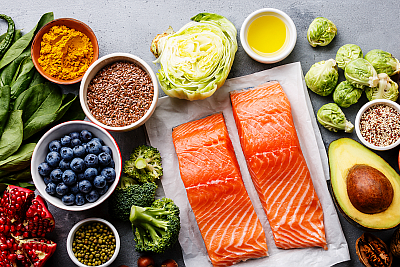When you fuel your body with healthy foods, you can feel it. You’re bursting with energy and ready to face the day.
It turns out the same is true for your mind. We rely on our brains for so much—to pay attention to what’s around us, experience our senses, learn and remember information, solve problems, concentrate, communicate, and more. Clear, sharp thinking can help you achieve your very best at work, at school, and in life.
We need to actively work to keep our brains healthy, like any other organ. But what does it take to maximize brain power? We turned to Dr. Philip Gorelick, a neurology expert and longtime volunteer with the American Heart Association (AHA), to find out.
A LIFELONG PROCESS

The role of the brain is, in a word, cognition. “Cognition is our ability to feel, think, and move,” Dr. Gorelick explains. “A healthy brain does all this automatically.”
Not only are these functions essential for a long, fulfilling life, but you can work on improving them at any age. “We used to think the brain health journey began and ended at older ages,” says Dr. Gorelick. “But more and more, researchers have noticed that early life has an impact.”
For example, we know that a mother’s health and diet during pregnancy affects her baby’s brain health and IQ, especially in the third trimester. Likewise, good nutrition, exercise, and other healthy habits can set young children up for future success.
This pattern continues into your 20s, 30s, and beyond. “Your lifestyle builds a foundation that can affect your brain health and other outcomes decades from now,” Dr. Gorelick adds.
5 WAYS TO BOOST YOUR BRAIN POWER
While honing your cognitive abilities is very much a long game, your mental sharpness may fluctuate day to day. Things in our environment, like stress or illness, can have an effect. How we treat our bodies matters, too.
Sound familiar? It should! “What’s good for the heart and overall health is generally good for the brain, and vice versa,” Dr. Gorelick tells us. That means you can reap many benefits from everyday healthy habits.
Here are his top 5 tips for keeping mentally fit. It’s never too late—or too early—to start!
1. Get social
It’s important to engage with family, friends, coworkers, and neighbors. Feeling connected to others can stave off depression, anxiety, and other mental health issues, especially as you age. “Social isolation is a big problem and can lead to mental decline,” shares Dr. Gorelick. And when we can’t be in person with loved ones, it can be even more important to find ways to connect socially.

Know how opposites attract? The more diverse your relationships, the more you will be challenged to think creatively. We all know someone with an exceptional memory, or whose spatial reasoning is second to none. Join forces and you can maximize your potential for solving problems, playing games, or just enjoying each other’s company.
2. Stay moving
Exercise remains one of the best things you can do for your mind, body, and soul. “Exercise is just terrific. It strengthens the heart and it’s great for the brain,” says Dr. Gorelick. “The American Heart Association recommends getting at least 75 minutes of vigorous exercise or 150 minutes of moderate exercise per week.” Play a team sport or find a walking buddy for extra socialization.
Physical activity can benefit our brain health in several different ways. It keeps your arteries flexible, which promotes blood flow to the brain. This, in turn, delivers more oxygen and glucose (aka, energy) so your brain can work properly. Exercise encourages new brain cells to grow, too. Moving more will help manage your cholesterol, blood sugar, and weight, all indicators of overall health.

3. Follow a nutritious diet
You are what you eat! According to the American Heart Association, a brain- and heart-healthy diet includes plenty of produce, lean animal or vegetable protein, low-fat dairy, nuts, legumes, and whole grains. The Mediterranean diet scores high points here since it includes many of these foods rich in omega-3s, B-vitamins and antioxidants, which are known to support brain health. Incorporating many of these foods into a healthy diet on a regular basis can improve the health of your brain, which could translate into better cognitive function, memory and alertness. Some of these foods include:
- Dark leafy greens like kale and spinach
- Fatty fish like salmon (2 servings/week)
- Antioxidant-rich berries
- Tea and coffee
- Walnuts (about 1 ounce/day)
Meanwhile, try to limit added salt, saturated fat, and sugar in your diet. If you choose to drink alcohol, do so in moderation. That means no more than one drink per day for women, two for men. According to Dr. Gorelick, if you don’t drink, don’t start.

4. Sleep on it
A quality night’s sleep always feels restful, but it’s also a time of great productivity. That’s because when you fall asleep your brain is still on the job processing all you learned during the day. “Getting enough sleep can help you retain information, remain alert, and solve problems,” Dr. Gorelick explains.
Aim for 7 to 9 hours of sleep a night. Hard as it may be, consistency is key. That means going to bed and waking up at the same time each day—even on weekends, vacations, and holidays.
5. Always be a student
From peekaboo to Memory, we play endless games to help babies and young children learn. Adults need mental stimulation, too. “Learning new things is really good exercise for your brain, and it can take many forms,” shares Dr. Gorelick.

Examples include tackling mind puzzles (think crosswords and Sudoku), picking up a new musical instrument, or trying a foreign language. The destination matters less than the journey, so follow whatever interests you—especially if it involves social interaction.
SHARP THINKING
Is your mind racing? Let this advice go straight to your head! For more tips, brush up on Life’s Simple 7 from the American Heart Association , a tool that has been shown to improve both heart and brain health. The more of the 7 you manage, the better off you are.
As Dr. Gorelick says, “The brain is really a treasure. We need to protect it.”
Note: Since everyone’s health history and nutritional needs are so different, please make sure that you talk with your doctor and a registered dietitian to get advice about the diet and exercise plan that‘s right for you.

